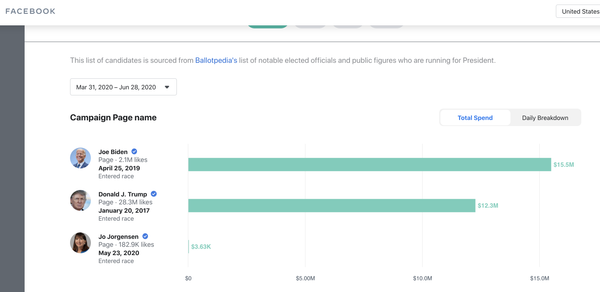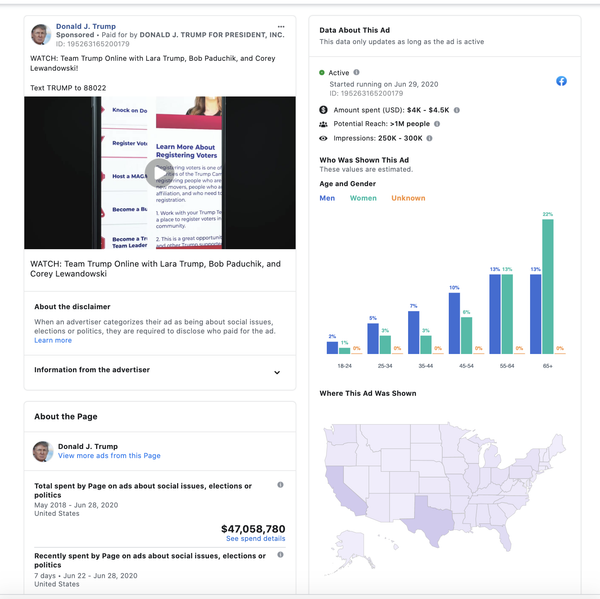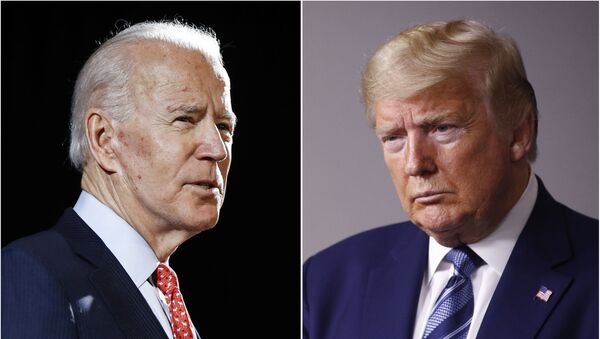Despite positioning themselves as neutral platforms Facebook and Twitter have become major political battlegrounds with Donald Trump and presumptive Democratic nominee Joe Biden bashing the social media giants as Election Day nears.
President Trump has spent millions on Facebook ads to accuse Twitter of interfering in the 2020 presidential race, editing and taking down posts. For his part, Biden has forked out to buy Facebook ads lambasting the platform over its apparent unwillingness to remove "inaccurate statements", especially those from his political rival.
What's Eating Trump and Biden?
"The 2016 Trump campaign was the first campaign in history to effectively harness the power of Facebook and Twitter to win an election and this was in no small part due to the groundbreaking methodology developed by Trump's 2016 digital media strategist, Brad Parscale", says Anthony Angelini, GOP political consultant. "Now that Parscale is once again filling that role, I can only expect that the 2020 Trump campaign intends to spend the next 100 days thinking of ways to further push the envelope on Facebook and Twitter".
The row between Trump and Twitter reached its peak in late May when the social media giant tagged a fact-check warning to the president's tweet. In the aftermath of this incident Trump signed an executive order which green lighted stripping social media giants of immunity under Section 230 of the Communications Decency Act (CDA) of 1996.
Big Tech is doing everything in their very considerable power to CENSOR in advance of the 2020 Election. If that happens, we no longer have our freedom. I will never let it happen! They tried hard in 2016, and lost. Now they are going absolutely CRAZY. Stay Tuned!!!
— Donald J. Trump (@realDonaldTrump) May 28, 2020
On 27 July, the president's administration took a step towards the fulfillment of Trump's executive order formally requesting the Federal Communications Commission (FCC) to clarify that Section 230 does not permit social media companies that alter or editorialize users’ speech to escape civil liability.
Biden's spat with Facebook erupted in early June, when his campaign released a petition and an open letter criticising the platform for "amplify[ing] misinformation and let[ting] candidates pay to target and confuse voters with lies". The Biden campaign demanded that the tech company fact-check election-related material and "enforce voter suppression rules against everyone – even the president".
Facebook refused to bow down citing the executive order and admitting that it would "protect political speech, even when [it] strongly disagree with it".
"It's a lose/lose situation for [Facebook and Twitter]", the political consultant notes. "On one hand, they don't like Trump, they don't support him, and they feel guilty about their platforms being used to further his agenda and his campaign. Plus they are constantly bombarded by leftists who believe it to be a moral obligation to prevent Trump from speaking. On the other hand, the people have a right to hear the uncensored truth".
Trump's Tweets & Ads Work, and Biden Knows This
"The angry and fearful political and economic climate in the United States plays well to Trump's strategy – to use controversy on Twitter, yet be a major advertisers on Facebook", echoes Dennis Yu, CEO of social analytics company BlitzMetrics.
The specialist admits that though Biden has spent more on ads than Trump ($15 million versus $12 million) in the last 90 days, "that doesn't tell us anything about relative engagement rates, since a Trump dollar is likely more effective than a Biden dollar".

"If you look at the top 30 political ads [on Facebook], most include Trump and not one has Biden - but some are negative towards Biden. Trump's own ads are getting great reach and engagement. Trump has over 70,000 ads in rotation versus only 8,000 by Biden", Yu elaborates.

According to Anthony Angelini, Biden's campaign ire is quite understandable as the Dems knows that Trump's tweets and ads do work and "can't allow his social media to continue business-as-usual".
In addition to the criticism voiced by the presumptive Democratic nominee, more than 1,100 organisations from the US, EU and Australia halted buying Facebook ads for the month of July in a bid to pressure the social media platform into taking action against "hate speech" and "deception" from politicians. However, according to a transcript of an internal meeting obtained by The Information on 1 July, Facebook CEO Mark Zuckerberg said he wouldn't submit to the financial pressure.
Despite being under increasing pressure, the big tech moguls are unlikely to end up going to war with Trump, deems Angelini.
"Right now, the best thing they can do is allow Biden and Trump to go to war with each other and spend millions of dollars in their platforms in order to wage it", the political consultant concludes.


